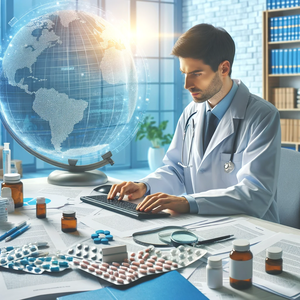-
 Find in Members
Find in Members Find in Videos
Find in Videos Find in Channels
Find in Channels
This website uses cookies to ensure you get the best experience on our website.
To learn more about our privacy policy Click herePrivacy Preference
- Tags - #Pharmaceutical Translation #Medical Localization #Regulatory Compliance #Clinical Trial Translation #Multilingual Pharmaceutical Services #AI in Translation #Cultural Sensitivity in Pharma #Global Pharmaceutical Market #Translation Technology #Professional Translation Services.
-
- Last updated December 28, 2023 0 comments, 97 views, 0 likes
- USA - Get Directions
More in Politics
Related Blogs
Archives
The Crucial Role of Translation and Localization in the Pharmaceutical Industry
Body
The Need for Expert Translation in Pharma
Translating medical and pharmaceutical documents presents unique challenges. The terminology is highly specialized, and precision is paramount. From clinical trial data to medication labels and patient information, accurate translation ensures safety and efficacy. For instance, an incorrect dosage instruction due to a translation error can lead to severe health risks.
Localization Beyond Translation
Localization involves adapting content to meet the cultural and regulatory needs of different markets. In pharmaceuticals, this means not only translating the text but also ensuring that it aligns with local laws and cultural norms. For example, what's considered an acceptable treatment in one country might be taboo in another. Localization bridges these gaps, ensuring that pharmaceutical products and information are appropriately received in each market https://www.pangea.global/pharma-translation-and-localization-services/.
Navigating Regulatory Compliance
Each country has its own set of regulatory requirements for pharmaceuticals. Navigating this complex landscape requires more than just language expertise; it demands an understanding of legal and regulatory nuances. Professional translation services that specialize in pharmaceuticals are adept at ensuring compliance, thus avoiding costly and dangerous errors.
Technological Advancements in Translation
Technological advancements, particularly in AI and machine learning, are transforming pharmaceutical translations. These technologies can process large volumes of text rapidly, ensuring efficiency. However, they cannot yet match the nuanced understanding of human experts, especially in handling sensitive or complex material.
The Human Element
Despite technological advances, the human element remains crucial in pharmaceutical translation. Contextual understanding, expertise in subject matter, and awareness of subtleties are aspects that only professional human translators can provide. The human touch is essential, especially in cases where a slight misinterpretation can have significant implications.
Expert translation and localization services are vital in the pharmaceutical industry. They ensure that medical products and information are not only accurately translated but also culturally and legally compliant across different regions. In an industry where errors can have serious consequences, the value of professional expertise cannot be overstated.
Photos
Map
-
Locations on MyWorldGo
Location Information
- Location: USA - Get Directions
- Formatted Address: Сполучені Штати Америки
- Country: Сполучені Штати Америки







Comments